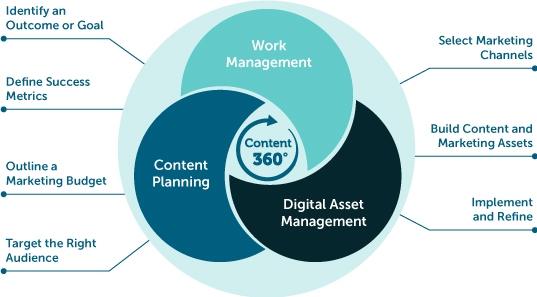Campaign management is more complex?and more expensive’than it have been for the past 10 years. With more marketing channels like TikTok and Reels emerging, marketers are putting out more content across more channels to win time and attention from prospects.
But it’s not just about more content. It’s about more value. 66% of customers report wanting more meaningful experiences from brands.
The demand for tactical, well-crafted, relevant campaigns and content is clear.
This article covers everything you need to deliver a memorable, valuable campaign. You’ll learn the following:
- What campaign management is and how it works
- Why careful campaign planning is so important
- The steps to create a successful campaign plan
- How technology improves your campaign and planning
What is Campaign Management?
Campaign management includes planning, executing, tracking, and analyzing marketing campaigns with a specific purpose.
Marketers use these campaigns to gain traction with new or revamped offers:
- Launching a new business venture
- Introducing a new product
- Raising awareness about new features
- Driving revenue during a high season
- Spreading awareness of incentives
These campaigns are built around a specific, desirable business outcome (such as more sales, service upgrades, and feature adoption). A campaign manager determines touchpoints and communication to move prospects toward this outcome.
Building the necessary momentum for one of these initiatives requires planning, precision, and data. It requires a marketing team that hits the right points for customers at the right time.
Modern campaigns are often built around a multi-channel strategy. They include video, web, and print marketing, social media engagement, and more. The complexity of these immersive campaigns can make delivery a challenge, which is why fast-paced and growth-minded organizations use content operations techniques and software to coordinate the content lifecycle. Harnessing your production and assets in this way leads to more effective campaign management overall.
Why Marketing Campaign Management is Important
Well-managed campaigns offer benefits to the functionality of your marketing team as well as the outcome of your campaign. Campaign management practices improve the way teams execute campaigns and increase customer response. These benefits drive revenue and improve the customer acquisition lifecycle.
Operational benefits
Streamlined process: Well-structured campaigns deliver the messaging and touchpoints necessary to advance the customer journey. With the right framework, your stakeholders know what’s expected and what success looks like.
Better visibility: A campaign collects and utilizes data from its marketing activities to increase both campaign-specific and overall visibility. Learnings from individual campaigns can achieve the following:
- Inform future decision-making
- Allow more accurate assumptions for future planning
- Enable better spend management for marketing campaigns
Improved results: Automated campaigns deliver better results than campaigns relying on guesswork. In fact, 80% of marketing automation users saw an increase in the number of leads using marketing automation software. 77% had an increase in conversions.
Campaign benefits:
More sales: The natural consequence of a well-planned campaign is that more customers see, consider, and buy the product or service featured in the campaign. Well-built campaigns give customers the opportunity and education needed to move toward a purchasing decision.
Increased brand awareness: Campaign management offers marketers long-term benefits even when customers don’t ultimately buy. Stakeholders fine-tune messaging, increase engagement across channels, and use insights to make improvements to the customer experience. Even when customers don’t take advantage of an offer or promotion, brand association and brand loyalty increase.
Better profitability: Well-managed campaigns are cost-effective. By creating more value without overspending, you retain more of a campaign’s returns as profit and improve the return on investment (ROI) metrics of your efforts.
How to plan a successful marketing campaign
All campaign plans start with a repeatable, effective planning process that outlines the goals, costs, methods, and measurements needed to succeed.
By using a project management approach to build and launch effective marketing campaigns, campaign managers acquire important data for optimization in future campaigns. Implementing a robust content operations platform can make this process easier by bringing together content planning, digital asset management, and work management together in one place.

Use these seven steps to outline a successful traditional or digital marketing campaign:
- Identify an outcome or goal
Successful campaigns drive a desired behavior or outcome. Identify the result you’re looking for (customer sign-ups, referrals, product purchases, landing-page visits, etc.) and craft the rest of the campaign around achieving that result.
- Define success metrics
Use the right metrics to gauge campaign success. By defining effective metrics as part of your initial campaign planning, you can measure progress early on, adjust assumptions and marketing efforts, and drive better overall results.
- Outline a marketing budget
Sticking to a budget is the only way to ensure a sufficient return on your campaign. Be sure to budget for staff time, advertising, marketing materials, technology costs, and any other line items relevant to your campaign.
- Target the right audience
Well-targeted campaigns convert better than those without an intended audience. Take time to build a buyer persona that clearly and accurately represents your target audience. This advanced research into your most likely buyer significantly improves the targeting and development of campaign materials and messaging.
- Select marketing channels
Unless your marketing strategy takes an omnichannel approach, multi-channel marketing campaigns often focus on reaching potential customers where they’re most likely to consume information. Define which channels (social media platforms, websites, and traditional channels such as TV or print media) are most effective for reaching your target demographics.
- Build content and marketing assets
Develop marketing materials and digital assets optimized for the channels selected in the previous step. Based on your target audience and demographic, a variety of tools and materials are effective for communicating your message:
- Social media marketing
- Educational videos
- Webinars and interactive tools
- Content marketing channels
- Advertising assets
- Landing pages
- Email marketing
- Implement and refine
Launch your campaign and collect data in real-time about the response. Based on those insights, adjust the plan and campaign activities for any touchpoints that miss the mark. Strategies such as A/B testing can further refine your messaging, content creation, and ad campaigns.
How campaign management tools help
Campaign management tools such as customer relationship management (CRM), marketing automation, and reporting platforms streamline execution while maximizing the cost-efficiency of your campaigns. Other tools effectively collect and use the information generated within campaigns.
Marketing automation tools play a significant role in improving the performance of campaigns. This is why over 78% of all media planners use them. Using automated planning and marketing tools, campaign planners can improve efficiency in their campaigns in several ways:
- Manage production workflows
- Create marketing funnels
- Expedite approvals
- Monitor marketing channels
- Organize and develop assets
- Collect and analyze data
Features to Look for in Campaign Management Software
Campaign management tools offer various capabilities and levels of functionality to help organizations share their message. While every solution is different, your chosen tool should offer the following features:
Ease of use: Adoption is one of the main factors in the success of a campaign management tool. Look for an intuitive UI, helpful features, guidance, and automation that makes campaign planning and execution easier. Easy interfaces make teams more likely to use software and maximize productivity.
Robust analytics: Data drives better campaigns, so look for a tool that offers fully featured reporting and analytics for various use cases. On-demand reporting from real-time data helps teams make decisions faster and adjust to market conditions with ease.
Collaboration tools: Successful campaigns rely on input from various stakeholders and creative professionals. A strong management tool will make it easy for these team members to collaborate, communicate, and coordinate the delivery of immersive experiences.
Multi-channel and content management: Content marketing is a powerful driver of digital campaigns, with over 82% of marketers relying on it to increase engagement. Be sure your content management system offers features for content and multi-channel marketing automation.
Integrations: While a campaign management tool can be powerful on its own, the ability to integrate with other systems further extends its functionality and effectiveness. Look for a tool with strong integration capabilities featuring other best-in-class tools.
Integrations can make strong tools even better. For example, pairing a powerful DAM with tools like campaign, analytics, metadata management, and business intelligence tools can enrich campaign intelligence, improve marketing measurements for deeper insights, and help teams improve campaign performance. These insights improve audience targeting personalization, and more.
___
Campaigns rely on expert planning and compelling content. Pairing solid campaign management with state-of-the-art digital asset management makes it easier for teams to deliver relevant, desirable content that engages customers.
How does your organization measure up in terms of digital asset management? Find out with the Aprimo DAM Capability Model.


